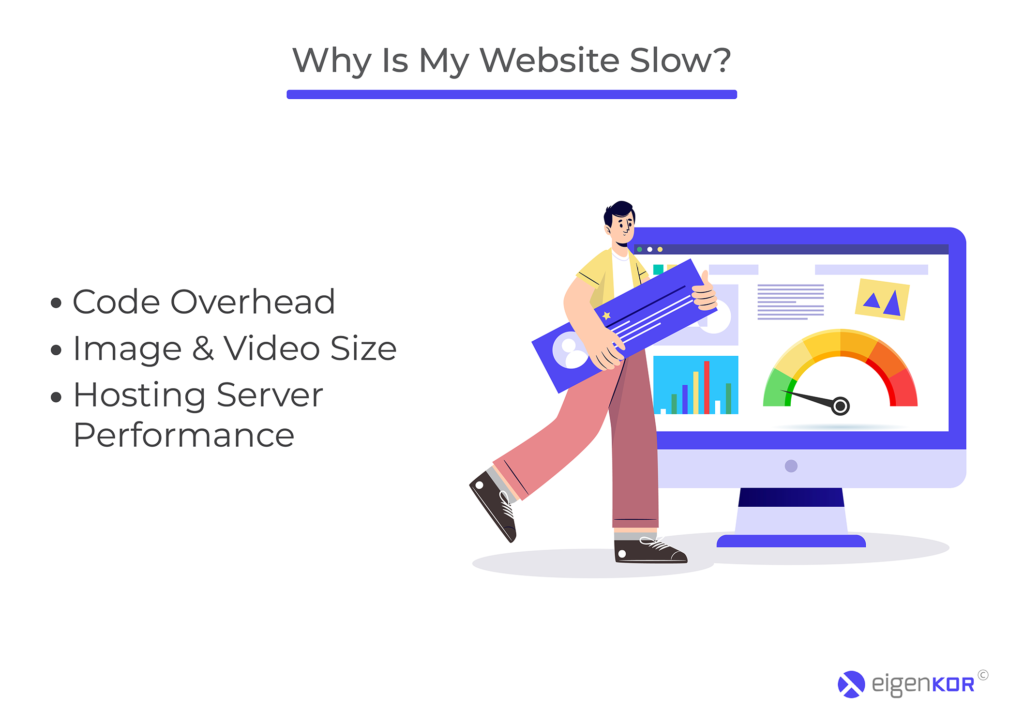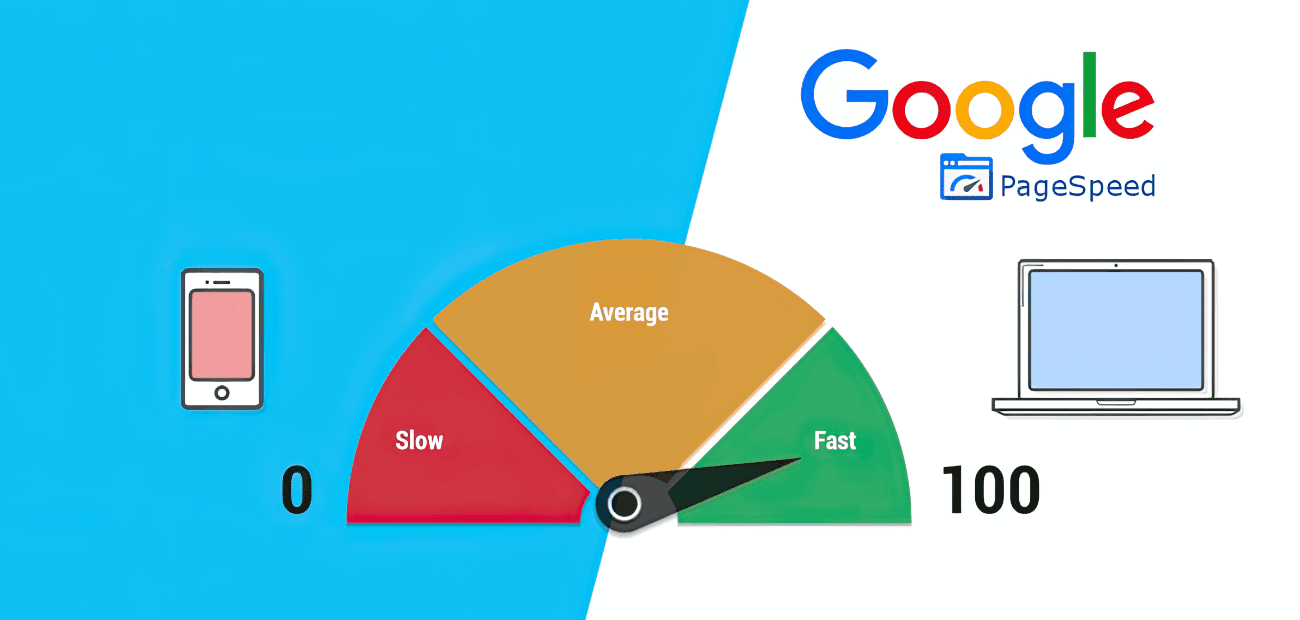Why your Website Page Load Speed is Crucial to Ranking Higher in Search Results
Your website page load speed can have a direct effect on your website’s SEO, user experience, and conversion rates.
It’s time to brush up on page speed if you’re still unsure of what it means, how to check it, or how to make it better.
The importance of your website’s page speed has never been greater.
Fast loading webpages are crucial since they have an impact on everything, including your website’s ranking and conversion rate.
We’ll cover all you need to know in this tutorial, including:
Navigate to:
A) What is page load speed?
B) Why is page load speed important?
C) What is a good page load speed?
D) Why is my website slow?
E) How to check your page load speed?
F) How to optimize your website page load speed?
A) What is page speed?

The duration it takes for a page on your website to load is known as page load speed. However, it’s a kind of a blanket phrase that refers to the speed of your website generally.
Here is a summary of the various components that make up a page speed measurement because there are several different methods for calculating page speed.
Time to first byte (TTFB)
This is the length of time to load the very first byte of information on your page. It’s usually a good indication of how fast the server loading time is.
Time to Interactive (TTI)
TTI looks at the length of time it takes for a page to load the interactive elements. This is a good way to see if your website is being slowed down by JavaScript.
First contentful paint (FCP)
This fairly odd phrase refers to the time it takes for the first element of content to load on your website. That could be text, an image (even a background image), or SVG.
Load time
The load time is the amount of time it takes to fully load a page and all its elements.
Mobile first
Technically speaking, this isn’t a test of page performance, but mobile first is another crucial factor in determining how quickly your website loads. This signifies that the tool is analyzing the mobile version of the site rather than the desktop version when evaluating the speed of your website.
This is due to the fact that speed is considerably more important while using a mobile device, and it is frequently here that the fundamentals of page speed optimization are disregarded.
B) Why is page speed important?

As far as SEO variables go, page speed is perhaps has the broadest impact because decreasing loading times boosts your rankings, user experience, and conversion rate.
It’s a rare instance of an SEO strategy that benefits virtually everyone!
Page speed and SEO
When it comes to SEO, page and site speed have become an essential part of how search engines rate your pages.
That’s because Google doesn’t want to deliver results that are slow loading and put users off. They’re trying to present the most relevant, most appropriate websites with their results.
Page speed and UX
User experience is the big reason that search engines think website speed is such an important factor, and that’s why it’s part of their ranking algorithms.
It’s a universally acknowledged fact that on the internet, no one has an attention span of more than a couple of seconds. So, if your webpage is taking more than 3 seconds to load, chances are the majority of your audience can’t be bothered to wait around for it.
You have to really want that content to wait that long.
Faster websites create a better user experience and so, in turn, search engines want to promote those websites above the slow ones with higher bounce rates.
Page speed and CRO
The last of the three big benefits of speeding up your website is conversion rate optimization (CRO).
CRO often gets a big boost when you improve page speed because you’re not losing users who are waiting for their page to load.
So overall, improving your page speed is going to help you rank higher, give your users a better experience, and improve your chances of getting that all-important conversion.
C) What is a good page speed?
Most people would say that 2 seconds or less is a good loading time. But this is a very difficult question to answer, as it does depend a lot on the type of page you have, and how you’re measuring your page speed.
Remember that people don’t necessarily need to wait for your entire page to fully load to use your website and get where they want to go. In some cases, it’s the time to Interactive (TTI), or the time it takes to load the first bits of content (FCP) that’s really important.
D) Why is my website slow?

There are a lot of reasons that your website might be running slowly, but here are a few of the most common issues and how to improve them.
Website speed and code overhead
Code overhead or bloat is a common factor in slowing down your website – particularly if you’re using a platform like WordPress.
When you use an off-the-shelf CMS, it has to carry a lot of code that’s not relevant to you or your website, and that code can slow your load times considerably.
Page speed and assets
The assets on your website, like images and video, are also a really common factor in the speed of your web pages.
Most people use the highest resolution image version they have – as that’s going to be the best quality, right?
Well, in a way that’s true, but while you want to START with the highest quality of image, you also want to minimize the file size, so it loads nice and quickly.
How your server affects page speed
One very common issue with loading speeds is having a slow server. And a big indicator that your hosting service isn’t operating at the performance you need.
If your host can’t deliver your files quickly, then it doesn’t matter how streamlined those files are, it’s going to feel slow to your user.
People often don’t consider their hosting a worthwhile investment, and simply go with the cheapest available – but they’re often making a compromise with the speed and security of their website.
E) How to check your page speed
There are lots of different tools available for testing your website loading times, but one of the most effective (and free!) services is Google PageSpeed Insights.
Google’s analysis of your website’s speed is going to play a role in how your website ranks, so it makes sense to use their tool to see how your website performs.
Not only will Page Speed Insights give you scores for your loading speeds, but it also outlines what elements of your website are slowing you down and how to resolve those issues.
For further insight, try combining it with the Expert Bulk Page Speed Test. This free bulk page speed analyzer provides data on how each page of your website is performing, including TTFB, FCP, and more.
F) How to optimize website speed
There are lots of different ways you can improve your website’s loading speed. These page speed optimization methods are usually the best place to start as they address some of the biggest and most common issues that slow your web pages down.
Get a good host
As we’ve already discussed, even if your website is built and optimized to be super-fast if it’s on a slow server you’re not going to reap the benefits. So, choosing the best hosting service for your needs is crucial.
You may also want to consider where your hosting provider’s servers are. Storing your files on servers located in the US when most of your customers are in the UK means that their request has to travel several thousand miles before reaching your website files.
Of course, the request is moving incredibly quickly, but the further it has to go, the longer it takes. So it’s usually best to have your servers in the same country as your audience.
Reduce image and file sizes
Images are often the biggest offenders when it comes to page speed. One simple change is to make sure you’re using responsive images. That means your website isn’t wasting time loading a desktop-sized image for your mobile website.
Reducing the size of files on your website is also really important. There are lots of great image compression tools out there, such as Tinify, which will reduce the size of your files and images without losing quality.
Convert images to WebP
Another way to speed up your image loading speeds is to use WebP format instead of jpg, png, or gif. This format is much faster loading without losing any image quality. Bear in mind that some legacy browsers don’t support WebP, so you might have to use a more traditional format as a fallback.
Try WebP converter to help speed up image conversion
Caching
Caching is when a browser saves a version of your webpage so that when you go back to it you don’t have to reload the entire thing all over again.
This can hugely speed up your website and is pretty straightforward to implement.
If your website is on WordPress, several WordPress plugins do a lot of the heavy lifting.
Minified code
Code bloat or code overhead is often a factor in the speed of your website, so making sure you’ve minified your code is essential if you’re going to have a good page speed.
Of course, this can be much more difficult if you’re relying on an off-the-shelf platform or software, so if you want to keep your code streamlined, you might want to consider getting a custom-designed, high-performance to start with.
Simplify redirects
This is a more common problem on websites that have been up and running for a while – especially if they’ve been through a couple of different iterations.
When you change your website structure, you often need to put in redirects to ensure people visiting old URLs are still being directed to appropriate pages.
But if you’ve restructured your website several times, it’s common to have multiple redirects, loops, or chains. All of these slow your website down as people get moved from URL to URL before reaching their ultimate landing page.
Streamlining your redirects will remove unnecessary steps and make sure you’re moving people to an appropriate page faster.
Content Delivery Network (CDN)
A content delivery network, or CDN stores a cached version of your website (or elements of your website) on servers in different locations. That means that instead of a request having to travel thousands of miles to access the files and load a page, they can be recovered quickly from a nearby server.
CDNs are particularly useful if you have a large, complex website with lots of pages and files, or if you have a lot of traffic to your site.
Why you should speed up your website
Page speed is a huge factor in your website’s success, as it can impact your search engine rankings, your customer satisfaction, and your conversion rate. If your page is slow and sluggish, resolving this needs to be your highest priority. Whenever we provide Local SEO Services, page speed is one of the first things we look at, as it’s one of the easiest ways to make a big improvement on your website. So, if you’re concerned that your website’s performance isn’t up to winning more customers and growing your revenue or want to see how to improve your page speed, get in touch with us, and we’ll be honored to assist! Contact us.
